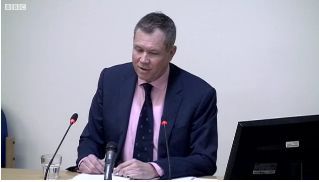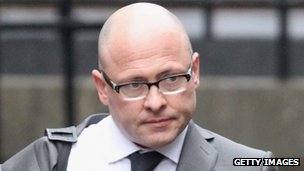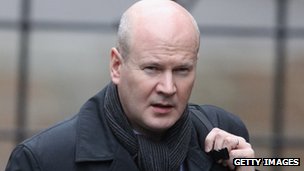 |
|
James
Hipwell: "Very unlikely Piers Morgan did not know hacking
was going on". |
Phone hacking appeared to be a "bog-standard journalistic tool" for
gathering information, a former Daily Mirror financial reporter has
said.
James Hipwell, who was jailed in 2006 for writing about firms whose
shares he owned, said he witnessed repeated privacy infringements at the
paper.
He told the Leveson Inquiry into media ethics that he overheard showbiz
journalists openly talking about it.
Publisher Trinity Mirror has insisted its journalists work within the
law.
It has also said they work within the Press Complaints Commission's (PCC)
code of conduct.
Meanwhile, Heather Mills, the former wife of singer Sir Paul McCartney,
has said in a statement that she never disclosed private voicemail
messages from her ex-husband to former Daily Mirror editor Piers Morgan.
It comes after the former tabloid editor, now an interviewer for
American broadcaster CNN, told the inquiry on Tuesday he had listened to
a voicemail message left to her by Sir Paul.
Mr Morgan, who firmly denied any knowledge of hacking under his
editorship, refused to say when or where he had heard the message -
because he wanted to protect "a source". He said he had no reason to
believe phone hacking was going on.
Ms Mills said she would be "more than happy" to answer any questions the
inquiry had for her about the subject.
CNN said it was "seeking a response to the Mills statement from Morgan".
'Privacy infringements'
On Wednesday, Mr Hipwell told the inquiry he had never been given a copy
of the code during his time at the paper, under Mr Morgan's editorship.
He said he never heard reference to the code, and said there were no
visible signs of ethical leadership.
In a statement read to the inquiry, he stated: "I witnessed journalists
carrying out repeated privacy infringements using what has now become a
well-known technique - to hack into the voicemail systems of
celebrities, their friends, publicists and public relations executives.
|
Flanagan at #leveson: would take a brave reporter to say he
wasn't sure about this, not filing a story today”
End Quote
Ross Hawkins
BBC correspondent |
"The openness and frequency of their hacking activities gave me the
impression that hacking was considered a bog-standard journalistic tool
for gathering information."
Mr Hipwell said he sat next to the showbiz team, where hacking took
place daily.
"Showbiz hacks discussed techniques and products of hacking openly," his
statement said.
"I would go as far as to say it happened every day. It became apparent
that a great number of stories... would come from that source."
He described Mr Morgan as "very hands-on" and the "beating heart" of the
newspaper, and said the editor spent half an hour every day discussing
the showbiz reporters' stories.
"Showbusiness is very close to his heart... and a lot of people who had
worked on the showbusiness desk had come from the Sun and they were old
friends," he said.
"Nothing really happened on that desk without Piers knowing about it."
On one occasion in 2000, Mr Hipwell said he saw a journalist openly hack
into Mr Morgan's phone.
"I don't think it elicited a great deal of information, but he certainly
tried," he said.
 |
|
Mr
Pilditch said reporting on the disappearance of Madeleine
McCann was "unsatisfactory" |
Mr Hipwell said he did not report that he had witnessed hacking because
senior editors accepted it.
He added that it was "very unlikely" Mr Morgan did not know that Mirror
journalists were hacking.
Mr Hipwell was jailed for purchasing low-priced stocks and then
recommending them to readers in the paper's City Slickers column,
selling them as their values soared
'Formal suspects'
He received a six-month prison sentence in February 2006 for pocketing
nearly £41,000.
Later, the inquiry heard from journalists covering the disappearance of
Madeleine McCann from Portugal at the time her parents Kate and Gerry
became "arguidos" - or formal suspects.
Daily Express journalist David Pilditch said it had been difficult to
cover the story because it was illegal for Portuguese police to talk
about the case, and he had to rely on sources.
Two of these were Portuguese journalists in contact with the police,
while a third was a translator who worked for police, he said.
 |
|
Considerations of the law were left to his superiors,
Express reporter Padraic Flanagan said |
He said it had been a "ludicrous state of affairs" and although he was
"confident of the veracity of the reports" he wrote, it made him feel
"uncomfortable".
"I knew... there were going to be difficulties if any complaints were
made because they weren't publicly declared statements," he said.
The Express newsdesk was well aware of the "fragility" of the situation,
he added.
Some of the articles that appeared in the paper falsely alleged the
McCanns were responsible for their daughter's death.
In March 2008, it led to Express Newspapers paying the couple £550,000
in libel damages and printing front-page apologies to the McCanns.
The McCanns told the inquiry last month that newspaper suggestions they
were responsible had left them distraught.
Later, another Express journalist, Padraic Flanagan, told the inquiry:
"Working in Portugal, the first question you asked yourself wasn't 'Can
I stand this up?'; it was 'What can I find today?'"
He said "considerations of the law" were left to his superiors.
And former Express reporter Nick Fagge said the story had become an
"obsession" of the editor.
"The editor of the time decided it was the only story he was interested
in and put it on the front page regardless of how strong the story was,"
he said.
The inquiry was later adjourned until 9 January |



